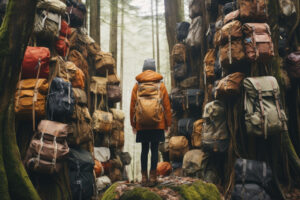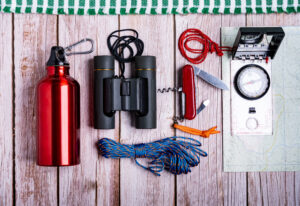Table of Contents
The Family Camping Adventure: Your Complete Preparation Guide
Hey there, fellow camping enthusiasts! Are you ready to embark on an unforgettable family camping adventure? Whether you’re a seasoned camper or a first-timer, this guide will help you prepare for a fantastic outdoor experience with your loved ones. Let’s dive in and make sure you’ve got everything covered for your upcoming trip!
1. Essential Gear and Equipment
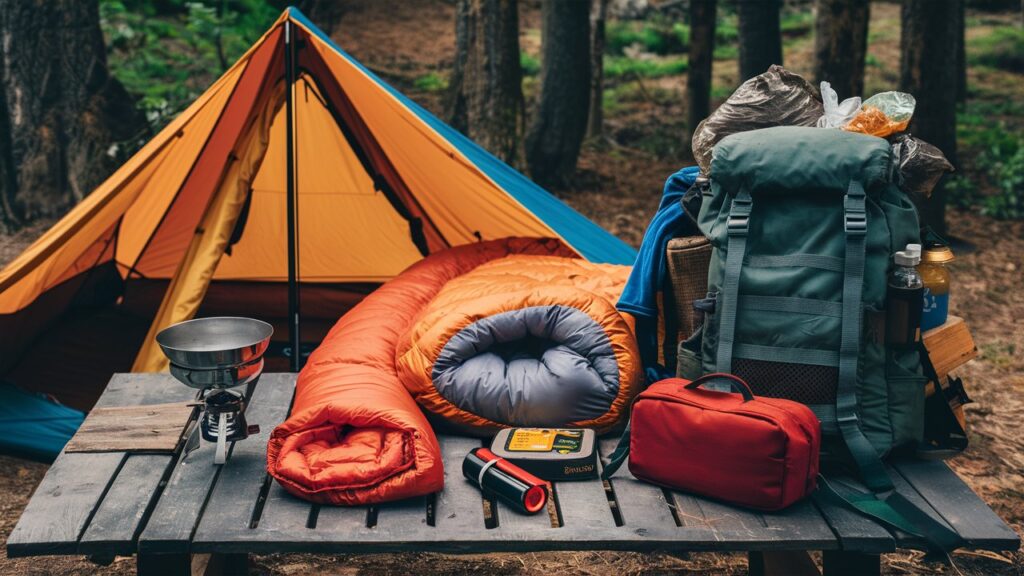
1.1. Shelter: Tents, tarps, and sleeping arrangements
When it comes to camping, your home away from home is crucial. Here’s what you’ll need:
- A sturdy tent that’s appropriate for your family size
- Waterproof tarps for extra protection
- Sleeping bags designed for the anticipated temperatures
- Sleeping pads or air mattresses for enhanced comfort
- Extra blankets for chilly nights
Pro tip: Practice setting up your tent at home before the trip. It will save you time and hassle at the campsite!
1.2. Cooking supplies: Stoves, fuel, and utensils
Feeding hungry campers is no small task. Make sure you pack:
- A reliable camping stove and fuel
- Pots, pans, and a kettle
- Plates, bowls, cups, and eating utensils
- A can opener, bottle opener, or multifunction tool
- Dish soap and scrubbers for cleaning up
1.3. Lighting: Lanterns, flashlights, and extra batteries
Don’t be left in the dark! Remember to bring:
- Lanterns for general campsite lighting
- Flashlights or headlamps for every family member
- Extra batteries or rechargeable power banks
- Glow sticks for fun nighttime activities
2. Meal Planning and Food Preparation
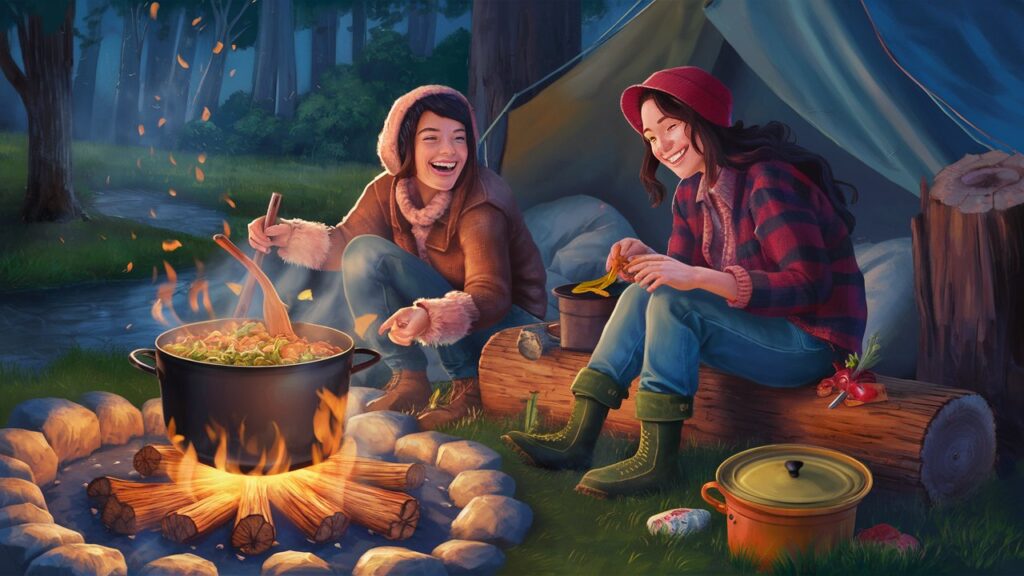
2.1. Menu creation: Balanced and easy-to-prepare meals
Planning your meals ahead of time can make your camping trip so much smoother. Consider:
- Simple breakfasts like oatmeal, fruit, and granola
- Lunch options that don’t require cooking, like sandwiches or wraps
- Hearty dinners that can be prepared in one pot or over the campfire
- Snacks to maintain your energy levels throughout the day
2.2. Food storage and cooler management
Keeping your food fresh and safe is essential. Remember to:
- Pack a high-quality cooler with plenty of ice
- Keep raw and cooked foods in separate containers
- Store food in airtight containers to prevent spills and attract wildlife
- Bring along a food thermometer to ensure proper cooking temperatures
2.3. Campfire cooking techniques and recipes
Cooking over a campfire can be an enjoyable family experience.. Try these ideas:
- Foil packet meals with veggies and protein
- Some classic camping dessert
- Dutch oven recipes for preparing more complex meals
- Kebabs for easy grilling over the fire
Remember: Always check local fire regulations before planning campfire meals!
3. Choosing the Perfect Campsite

3.1. Researching and reserving campsites
Selecting the right campsite can greatly impact your trip. Here’s how to do it:
- Research different campgrounds in your desired area
- Check reviews from fellow campers for genuine insights
- Book your site well ahead of time, particularly for popular locations
- Take into account the season and possible weather conditions
3.2. Factors to consider: Amenities, terrain, and accessibility
When selecting a campsite, think about:
- Proximity to bathrooms and water sources
- Level ground for pitching tents
- Shade coverage for hot days
- Distance from busy roads or noisy areas
- Accessibility for any family members with mobility issues
3.3. Setting up camp: Layout and organization tips
Once you’ve arrived, set up your campsite efficiently:
- Place your tent on high ground to avoid water pooling
- Create a designated cooking area away from sleeping zones
- Set up a common area for family gatherings and meals
- Use tarps or pop-up canopies for extra shelter from sun or rain
4. Safety Measures and First Aid
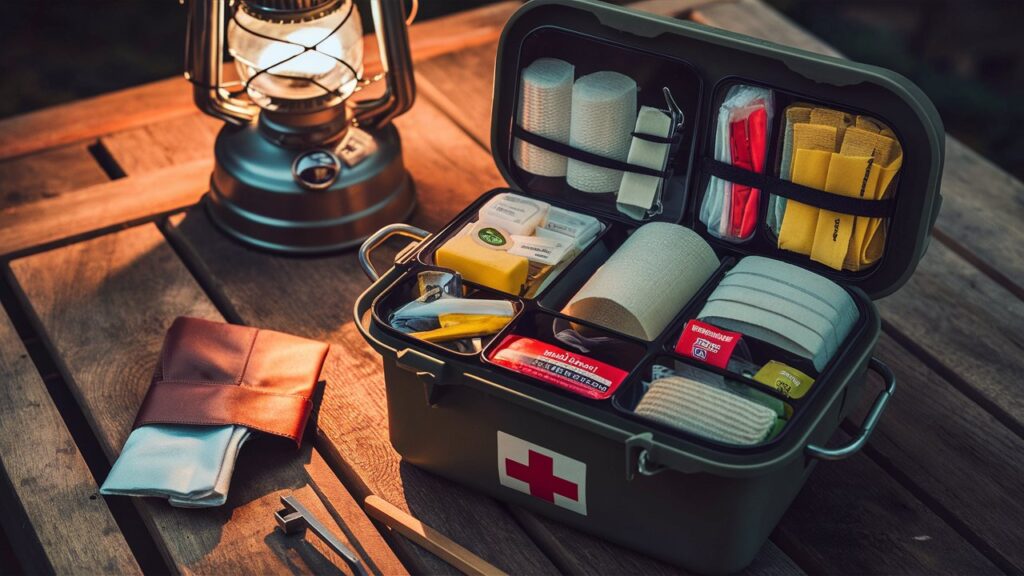
4.1. First aid kit essentials and medications
Be ready for minor injuries and illnesses with:
- Bandages, gauze, and antiseptic wipes
- Pain relievers and antihistamines
- Any prescription medications your family needs
- Insect bite treatment and sunburn relief
4.2. Wildlife awareness and precautions
Respect the local wildlife and stay safe by:
- Storing food properly to avoid attracting animals
- Learning about local wildlife and how to respond to encounters
- Make noise while hiking to notify animals of your presence
- Maintain a safe distance from all wildlife
4.3. Emergency preparedness and communication plans
Stay safe in case of emergencies:
- Let a friend or family member know the details of your trip
- Carry a portable charger and make sure your phone is fully charged.
- Pack a whistle for each family member in case of separation
- Be aware of the nearest hospital or emergency services location
5. Family-Friendly Activities and Entertainment
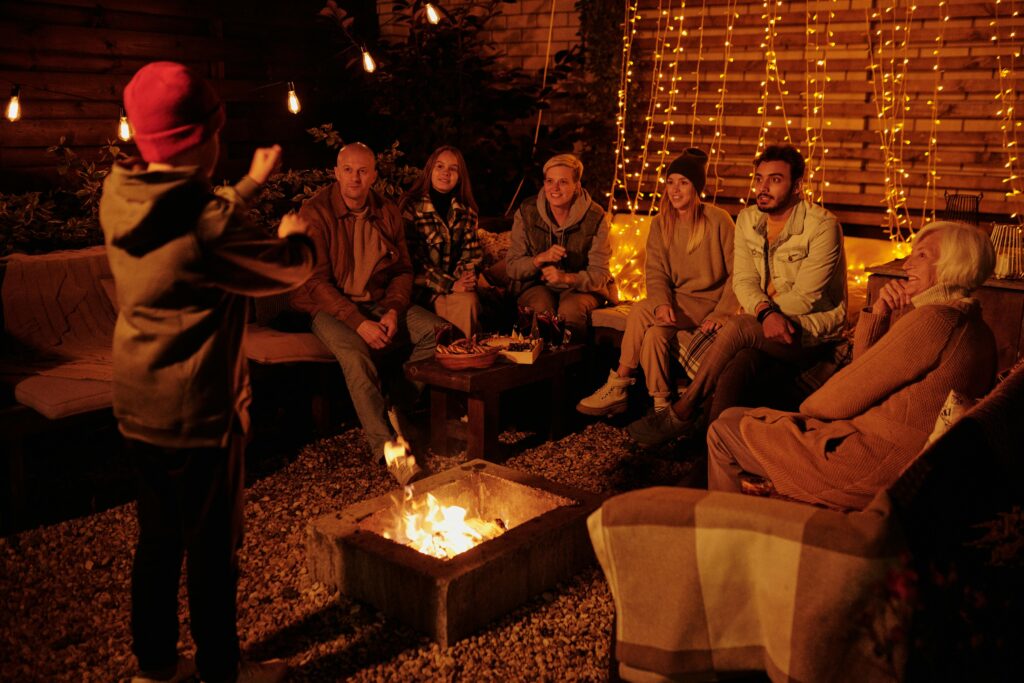
5.1. Nature exploration: Hiking, birdwatching, and plant identification
Engage with nature through activities like:
- Family-friendly hikes suitable for all ages
- Birdwatching with a field guide or app
- Plant identification games
- Nature scavenger hunts
5.2. Outdoor games and sports equipment
Keep everyone active and entertained with:
- Frisbees or footballs for throwing games
- Card games or travel-sized board games
- Kites for windy days
- Binoculars for wildlife spotting
5.3. Evening activities: Storytelling, stargazing, and campfire games
Make nights magical with:
- Ghost stories (not too scary for little ones!)
- Stargazing apps to identify constellations
- Campfire songs and sing-alongs
6. Clothing and Personal Items
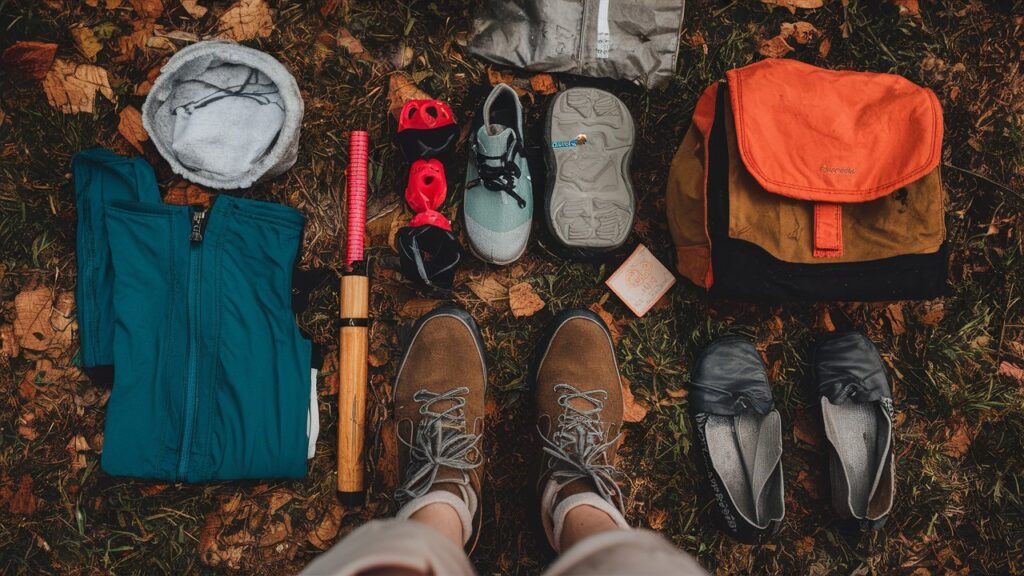
6.1. Weather-appropriate attire and layering strategies
Be ready for any weather with:
- Moisture-wicking base layers
- Insulating mid-layers like fleece or wool
- Waterproof outer layers
- Extra socks and underwear
6.2. Footwear for various terrains and activities
Pack appropriate shoes for all occasions:
- Sturdy hiking boots for trails
- Water shoes for creek exploration
- Comfortable camp shoes for around the site
- Flip-flops for shower use (if available)
6.3. Personal hygiene supplies and toiletries
Stay clean and comfortable with:
- Biodegradable soap and shampoo
- Toothbrushes and toothpaste
- Deodorant and other personal care items
- Quick-dry towels and washcloths
7. Leave No Trace Principles
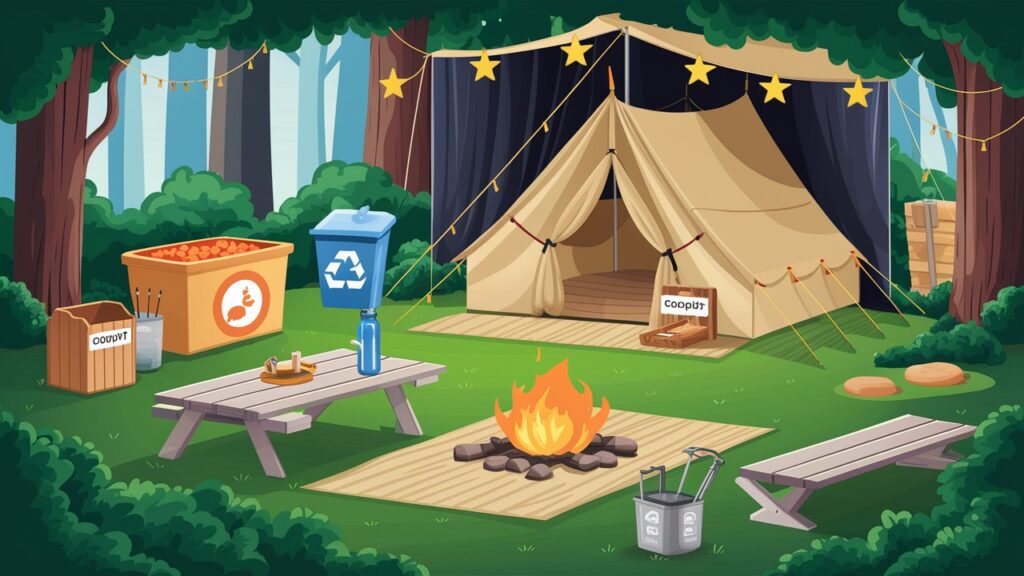
7.1. Proper waste disposal and campsite cleanliness
Keep nature pristine by:
- Packing out all trash, including food scraps
- Using designated restroom facilities or proper backcountry techniques
- Leaving your campsite in better condition than you found it
- Avoiding the use of soap directly in natural water sources
7.2. Minimizing impact on flora and fauna
Protect the environment by:
- Staying on designated trails while hiking
- Not picking flowers or disturbing plants
- Observing wildlife from a distance
- Avoiding feeding any animals, even seemingly harmless ones
7.3. Teaching children about environmental responsibility
Instill good habits in the next generation:
- Explain the importance of preserving nature
- Make cleaning up the campsite a fun family activity
- Encourage kids to spot and appreciate small details in nature
- Lead by example in all your outdoor practices
Summary
Congratulations! You’re now equipped with all the knowledge you need for an amazing family camping trip. Remember, the key to a great outdoor adventure is preparation, flexibility, and a positive attitude. Embrace the unexpected, enjoy quality time with your loved ones, and create memories that will last a lifetime. Happy camping!
Frequently Asked Questions
What should I do if it rains during our camping trip?
Be prepared with waterproof gear, tarps, and indoor activities. Stay positive and make the most of the situation – puddle jumping can be fun for kids!
How can I keep my family safe from insects and ticks?
Apply insect repellent, wear long sleeves and pants, and frequently check for ticks. Consider treating clothing with permethrin for extra protection.
What are some easy meals to prepare while camping with kids?
Try simple one-pot meals like chili or pasta, sandwiches, and foods that can be cooked over the campfire like hot dogs or foil packet dinners.
How do I choose the right sized tent for my family?
Look for a tent that’s rated for at least one person more than your family size to ensure comfort. Consider the seasons you’ll be camping in and the tent’s weather resistance.
What should I include in my camping first aid kit?
Essential items include bandages, antiseptic wipes, pain relievers, antihistamines, tweezers, and any personal medications. Don’t forget items like sunscreen and insect repellent too!


